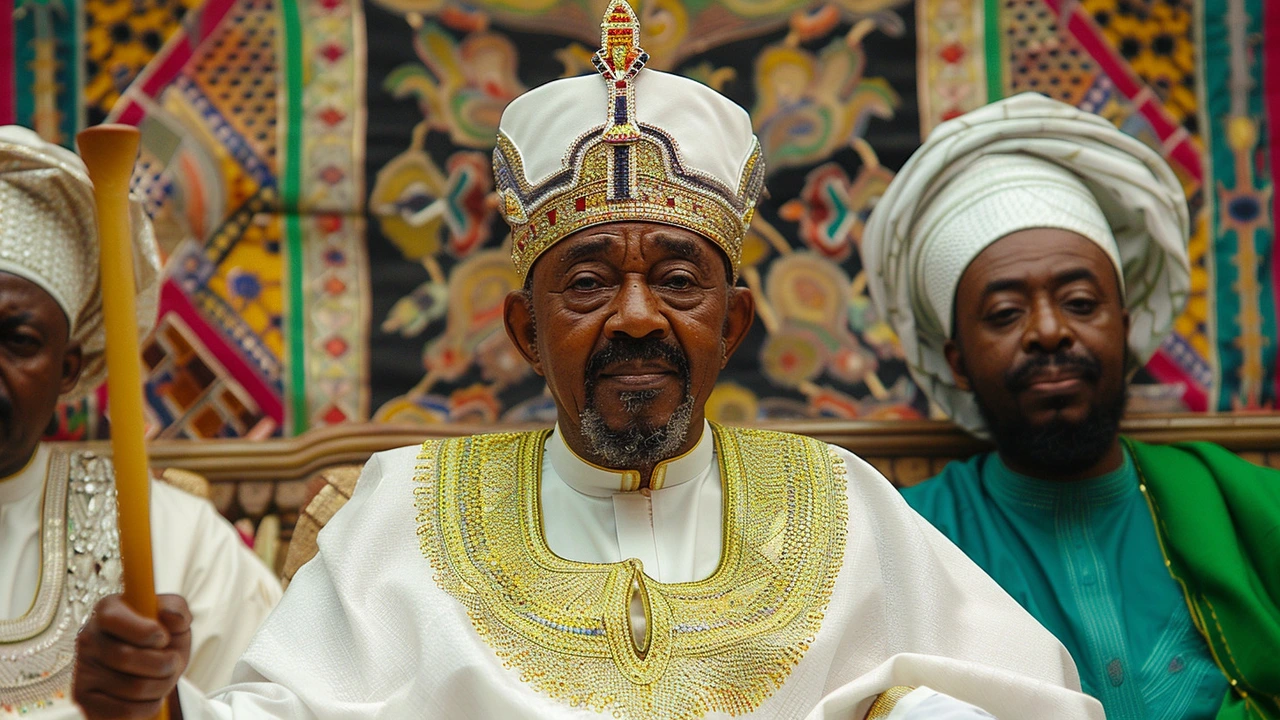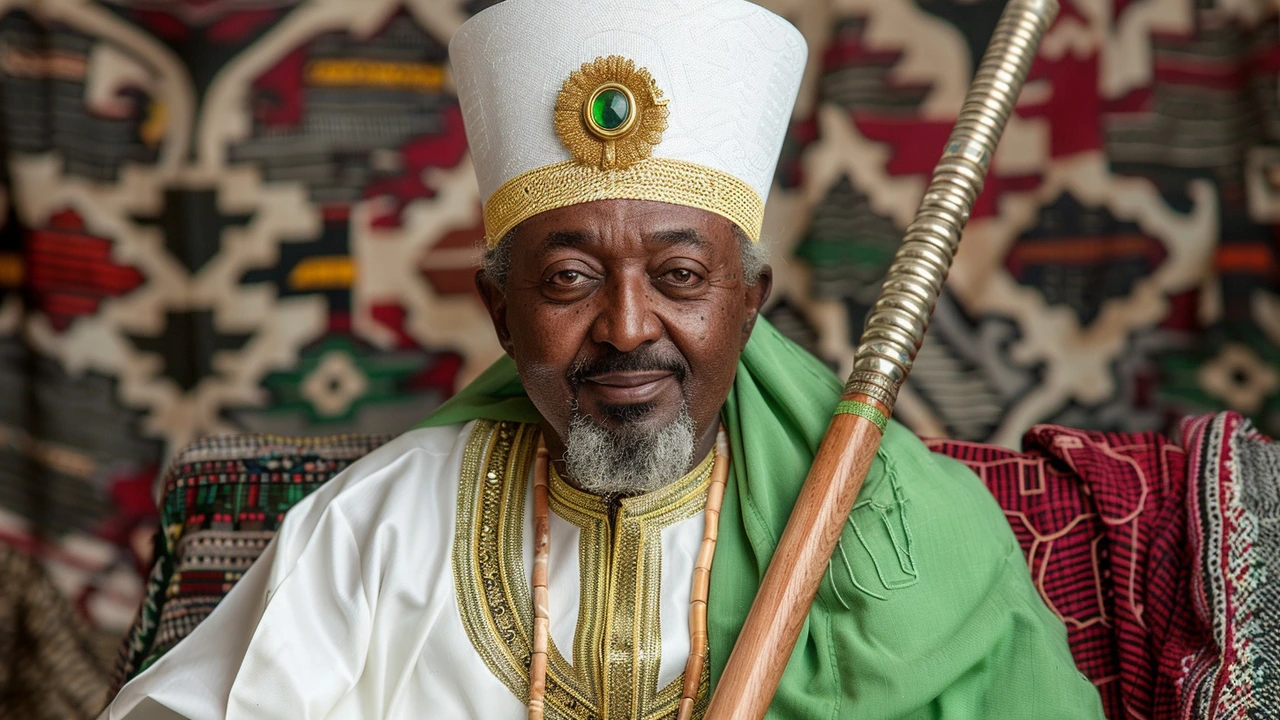Conflicting Court Orders Stir Controversy in Kano State Over Emir Sanusi's Eviction
In a developing legal drama that has engrossed Kano State, Nigeria, two courts have issued contradictory orders regarding the eviction of the reinstated Emir of Kano, Muhammadu Sanusi II, from his official residence at the Emir's Palace. The situation has drawn significant attention and created a state of uncertainty and tension among the stakeholders involved.
The Federal High Court, under Justice S. A. Amobeda, has taken a firm stance by ordering Emir Sanusi's eviction. The court's directive instructs the Nigerian Police to facilitate the eviction process and ensure that all privileges due to Aminu Bayero, the 15th Fulani Emir of Kano, are accorded to him. This decision, as per the court, aims to uphold peace and order within the state by resolving the conflicting claims over the Emir's title and residence.
Contrarily, in a surprising twist, Justice Amina Aliyu of the Kano State High Court has issued an interim injunction that complicates the situation further. Justice Aliyu's order restrains the Police and other security agencies from harassing, intimidating, or evicting Sanusi from his palace residence. This injunction remains effective until the hearing and determination of the lawsuit brought forward by Sanusi's counsel, pushing the Federal High Court's enforcement deadline into a state of suspension.
Backdrop of the Controversy
The conflict traces its roots back to a more extensive political and cultural narrative that has exponentially intensified in recent times. Muhammadu Sanusi II, known for his reformative stance and outspoken nature, has had a tumultuous history with the political establishment of Kano State. His initial dethronement and subsequent reinstatement have only added layers of complexity to this ongoing saga.
The sequence of events leading up to the current legal tug-of-war began when Sanusi was adjudged to have been wrongly dethroned by the Federal High Court. The court restored his status but did not explicitly outline the distribution of privileges between Sanusi and Aminu Bayero, which has now become the crux of the matter. This oversight led to Bayero's claim to the throne, thus culminating in conflicting orders from the respective courts.
Details of Court Proceedings
Justice Amobeda's ruling from the Federal High Court set the ground for Bayero's ascension by declaring Sanusi's eviction. The police were instructed to implement the court's order meticulously, ensuring that there is no ambiguity about the rightful holder of the Emir's title and residence. The urgency of the order was underscored for maintaining social tranquility and avoiding any potential clashes between rival factions.
On the flip side, Justice Aliyu of the Kano State High Court emphasized procedural fairness and the right to a dignified hearing. Her interim injunction was grounded on constitutional and humanitarian grounds, arguing that no eviction should occur without giving Sanusi adequate opportunity to contest the grounds of his eviction. This decision has instilled a sense of temporary relief among Sanusi's supporters, who view the interim injunction as a necessary pause to reassess the legitimacy of both Emirs' claims.
The two legal orders, now at loggerheads, have set the stage for a dramatic courtroom showdowns. The Federal High Court is slated to reconvene on June 4, while the Kano State High Court will hear Sanusi's motion on June 13. These dates are eagerly anticipated as they promise to provide further clarity on this convoluted issue.
Implications on Kano's Stability
The implications of these conflicting orders extend beyond the walls of the courtroom, influencing the broader sociopolitical landscape of Kano State. The region, possessing rich cultural significance and historical depth, views its Emirate not just as a traditional institution but as a symbol of communal unity. Any upheaval within this institution has widespread ramifications, potentially destabilizing the peace and disrupting the social fabric of the community.
For the local populace, the Emir represents a bastion of cultural heritage and an arbiter of traditional norms. While some factions support Sanusi for his progressive reforms and fearless critique of government policies, others view Bayero as the legitimate heir, deserving of his rightful place in the Emir's Palace. This division underscores the nuanced and often contentious nature of traditional leadership in contemporary Nigeria.
Political Ramifications
Both court orders not only reflect the judicial intricacies but also mirror the political undercurrents that are at play. Sanusi's relationship with the Kano State government has been fraught with tension, especially given his vocal opposition to certain state policies and administrative decisions. His reinstatement is perceived by some as a judicial rebuke to the political machinations that led to his initial dethronement.
Governor Abdullahi Ganduje's administration, which played a pivotal role in Sanusi's dethronement, is now placed in a delicate position. The governor's endorsement of the Federal High Court's order aligns with his administration's stance but conflicts with the local court's injunction, putting him at odds with judicial prudence. This dichotomy not only paints a picture of a fragmented governance system but also raises questions about the interplay between state and federal judicial powers.

Future Prospects and Conclusion
As the judicial proceedings advance, the outcomes of the forthcoming court sessions hold critical importance. Whether the Federal High Court's eviction order will prevail or the Kano State High Court's interim injunction will be upheld is a matter of significant interest. The answers will not only determine the immediate residence of Emir Sanusi but will also set a precedent for future disputes of a similar nature.
In the weeks leading up to the court hearings, the atmosphere in Kano remains charged. Supporters of both Emirs are mobilizing to put forth their cases, while the police and local authorities are on high alert to prevent any outbreak of violence. The twin court orders have inadvertently sparked a larger dialogue on the roles, responsibilities, and rights associated with traditional leadership in Nigeria, urging a reevaluation of such institutions in modern governance.
Ultimately, this controversy serves as a reminder of the intricate balance required between tradition and modernity, judicial authority and political power, and the community's will with governmental oversight. As Kano State navigates this complex legal landscape, the ensuing decisions will inevitably shape its future, reflecting the eternal conflict between preserving cultural heritage and adapting to contemporary reforms.


 Sports
Sports
Ron Rementilla
May 29, 2024 AT 00:41The clash basically boils down to a jurisdictional tug‑of‑war between federal and state courts.
Chand Shahzad
May 29, 2024 AT 04:33The dual rulings expose a systemic weakness in coordinating judicial authority across Nigeria’s federal structure. While the Federal High Court seeks to enforce a decisive eviction, the Kano State High Court emphasizes procedural safeguards. This balance of power is meant to prevent unilateral actions that could destabilize local governance. Moreover, the interim injunction underscores the judiciary’s role in protecting individual rights amid political turbulence.
Byron Marcos Gonzalez
May 29, 2024 AT 18:26When you peel back the layers of this legal quagmire, you discover a tapestry woven from colonial legacies, modern politics, and cultural identity. The Emirate of Kano is not merely a ceremonial post; it is a living emblem of centuries‑old authority that commands both reverence and scrutiny. Sanusi’s reformist agenda, marked by outspoken critiques of fiscal mismanagement, rattled the entrenched power brokers who have long guarded their privilege. His reinstatement by the Federal High Court was, in many ways, a judicial rebuke to those very gatekeepers.
Yet the Kano State High Court’s injunction acts as a reminder that justice cannot be a one‑way street. By halting the police from executing the eviction, the court enforces the principle that any deprivation of rights demands due process. This procedural pause buys time for the parties to air grievances, lest the state descend into factional violence. The governor’s alignment with the federal order reflects a political calculus aimed at preserving his own legitimacy, especially after the backlash from Sanusi’s earlier removal.
In the broader Nigerian context, this saga highlights the tension between traditional institutions and a rapidly evolving democratic framework. The dual orders illustrate how legal mechanisms can both protect and challenge heritage, depending on the interpretive lens of the judges. The upcoming hearings on June 4 and June 13 will likely set precedents for how future disputes over monarchic authority are resolved. If the federal verdict prevails, it could embolden centralized interventions in regional matters. Conversely, a sustained injunction would empower state courts to act as custodians of local customs.
Stakeholders on the ground-scholars, civil society groups, and everyday citizens-are already mobilizing. Some view Sanusi as a symbol of progressive change, while others rally behind Bayero, seeing him as the custodian of continuity. The police, caught in the crossfire, must navigate a delicate balance between enforcement and restraint. Any misstep could ignite flashpoints that reverberate beyond Kano’s borders, affecting national stability.
Ultimately, this conflict is a microcosm of Nigeria’s ongoing struggle to harmonize its rich tapestry of traditions with the imperatives of modern governance. The resolution will not only determine who sleeps in the palace tonight but also signal the direction of the country’s constitutional evolution.
Emanuel Hantig
May 30, 2024 AT 00:00Reading through the layers of legal maneuvering, one can’t help but feel the weight of history pressing on the present. It’s a reminder that every decision reverberates through communities that look to the Emir for both guidance and identity 😊. The balance between respecting tradition and enforcing modern legal standards is delicate, and the courts are walking a tightrope. While the federal decree aims for swift resolution, the state injunction protects a fundamental right to be heard. In the end, whatever the outcome, the people of Kano deserve a process that honors both rule of law and cultural heritage.
Eduardo Torres
May 30, 2024 AT 05:33The situation will surely shape future court‑state relations across the nation.